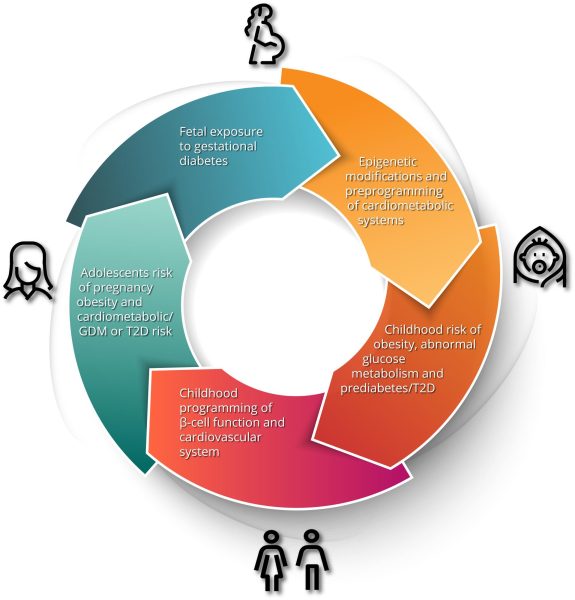A recent study has broken through the barriers of science, linking pregnancy diabetes (also known as gestational/maternal diabetes) to diagnoses of autism and ADHD in children. The severity of diabetes, if not well-controlled, could play a fundamental role in increasing the risk of autism and ADHD in offspring: researchers, doctors, and scientists are investigating possible risks that may be significant for new mothers or any woman who is considering pregnancy. As of 2021, gestational diabetes has affected 17% of all births globally.
The risk factors are as follows:
- If you are overweight
- If you are over the age of 45
- If you have a family history of type 2 diabetes
- If you have the hormone disorder, Polycystic ovary syndrome
- If you have given birth to a child who was over 9 pounds
- If you had gestational diabetes during a previous pregnancy
- If you are an African-American, Hispanic or Latino, American Indian, Alaska Native, Native Hawaiian, or Pacific Islander
Factors such as a woman’s age or body mass index should be considered. Make sure to get tested for diabetes if any of these factors concern you.
What are the causes?
Gestational/maternal diabetes occurs when the body cannot produce insulin during pregnancy. Insulin is a hormone produced by the pancreas that helps the body use glucose, or sugar, for energy, thereby regulating blood sugar levels.
The actual cause of this kind of diabetes isn’t known. Still, there is a theory – the placenta (the organ that delivers water and nutrients to the baby) produces hormones that block the mother’s ability to use insulin effectively. As the pregnancy progresses and the baby grows, so do the placenta and hormones; glucose builds up in the blood, rather than being utilized by the baby and the mother. Even though it’s considered a theory, doctors widely accept this.
What are the consequences of gestational diabetes?
If not treated or uncontrolled, maternal diabetes could cause numerous health difficulties for the mother and the child. These consequences can be long-term for the mother and the child.
For the mother, there is an increased risk of preeclampsia – a condition characterized by high blood pressure and protein in the urine. Preeclampsia alone could disrupt the delivery process of the baby. Around 28,000 women who gave birth to a child with preeclampsia were 1.29 times as likely as their child to be born with autism and more prone to disorders such as epilepsy, attention deficit disorder (ADHD), and other intellectual disabilities, such as cerebral palsy and hearing or vision loss. After pregnancy, women could still be at risk for type 2 diabetes. The mother could be at risk for cardiovascular disease – a study on cardiovascular disease was performed on 1 million mothers and found a 40% higher risk for heart attacks. A preterm baby or a C-section could also be a risk for the mother.
As for the baby, the child may grow excessively large due to the blood sugar levels, creating what is known as macrosomia. With macrosomia, there could be an increased risk of shoulder dystocia as well as other injuries. While the mothers may experience high insulin levels, the child could be at risk for hypoglycemia, otherwise known as low blood sugar levels. While mothers might get an increased risk of obesity and type 2 diabetes, so could their offspring. Childhood asthma is considered to be a possibility for the child. If maternal diabetes is still left untreated, there is a chance of stillbirth.
Link Between ADHD, Autism, and Maternal Diabetes
202 studies were conducted on 56 million pregnant women, yielding a wealth of data and information. Children who were born to a mother with gestational diabetes have a 28% increased risk of developing a neurological disability compared to children whose mothers don’t have maternal diabetes.
When broken down, scientists found:
- 16% increased risk for learning disabilities
- 17% increased risk for motor disorders
- 20% increased risk of communication disorders
- 25% increased risk of autism
- 27% increased risk for any specific developmental disabilities
- 30% increased risk for ADHD
- 32% increased risk of developing an intellectual disability
It is unclear what the connection is between maternal diabetes and offspring having a neurological disability. However, the authors of the study propose that Type 1 diabetes might increase inflammation in children, which correlates with rises in ADHD and autism. High blood sugar levels have been known to cause birth defects in children, like spina bifida and anencephaly. This medical study is still an ongoing investigation.
While there is an increased risk of these disorders, it’s essential to know that not all children whose mother had gestational diabetes will develop these disorders. According to Dr. Susan Spratt, an endocrinology professor at Duke University School of Medicine, it is unsurprising that elevated blood sugar may also impact other forms of neurological development. Doctors have known that elevated blood pressure could cause deformities and disabilities in the offspring, but doctors and pediatricians often overlooked gestational diabetes.









